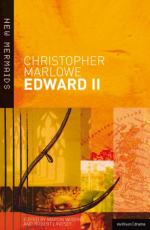|
This section contains 649 words (approx. 2 pages at 400 words per page) |

|
Blank Verse
Blank verse, unrhymed lines with a measured rhythm, was not invented by Christopher Marlowe, but he is credited with having instituted its use in English drama. The rhythm usually takes the form of iambic pentameter, ten syllables with the accent falling on every other syllable. Marlowe's blank verse demonstrates how the measure can be varied, using slight variations in accenting or in the placement of pauses (caesura) to retain the freshness of normal speech, while maintaining the formality of poetry. Because of its great flexibility, it is a medium that lends itself perfectly to the expression of natural sentences: "Here, take my crown, the life of Edward too, / Two kings in England cannot reign at once." Although balanced by the rhythm, these two lines also contain the spontaneity of unrehearsed speech. In the hands of Shakespeare, the same form became even more elastic: "For God's sake, let...
|
This section contains 649 words (approx. 2 pages at 400 words per page) |

|




